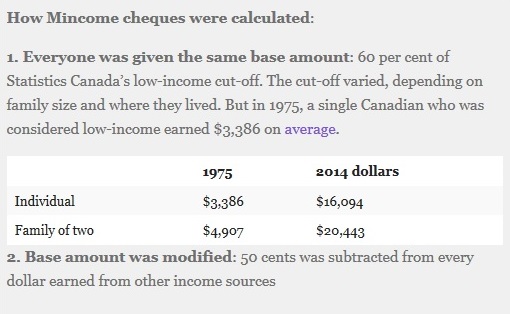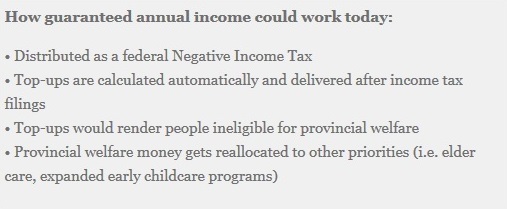
Between 1974 and 1979, citizens of the city of Dauphin, Manitoba were selected to take part in an economic experiment in which the poorest residents were ensured a basic income to bring them above the poverty line. The experiment was apparently a tremendous success, but unfortunately, when the Conservative government took federal power in 1979, the project came to an end, and its results were archived from public view. Thanks to Dr. Evelyn Forget, researcher at the University of Manitoba, this information has been tracked down, though the chances of getting any sort of right-wing government to accept a program such as this are little to none.
The program itself was dubbed “Mincome,” short for “minimum income,” and according to reports, it was the first of its kind in North America. The program was not used as a means of giving citizens a “free-ride,” but rather the project’s aim was to evaluate whether or not supplying additional money to the poorest residents would stunt their motivation to work. The study shows it didn’t.
In a statement from one of Dauphin’s residents at the time, now 87-year-old Frances Amy Richardson:
“Well, that was quite a few years ago. There was a lot of people that really benefitted from it.” She later continues, “It was a lot of good, but see, the Manitoba government and the federal government both went out of power that year and they ran out of money – so it was just dropped.”
The town of Dauphin was chosen for the project since one-third of its residents qualified for Mincome cheques (checks). Under the leadership of Edward Schreyer, “the left-leaning provincial NDP,” the Manitoba federal government agreed to pay 75% of the $17-million budget for the project, the rest was paid by the province. Here is how the Mincome cheques were calculated:

According to Dr. Evelyn Forget, what made this program successful despite the costs was the money it ended up saving in the long run, as well as the lives it affected. Another woman who took part in the experiment was able to obtain an education, despite being a single, working mother of two, and from that education she went into a well-paying career. Overall hospitalization rates dropped dramatically, proving that a positive measurable impact on the health care system would accompany such a program, saving the community additional money.
The welfare system in Canada, which is very much like the welfare system in America, has been criticized as being a “box with a tight lid,” according to TD Bank’s former chief economist, Don Drummond, meaning that you have to be destitute to be accepted, and once in, the welfare system does not provide the means of getting out again. Drummond comments:
“But the record shows once you become destitute you tend to stay in that state. You have no means to absorb setbacks in income or unexpected costs. You can’t afford to move to where jobs might be or upgrade your skills.”
This is a tune many Americans know well. With a system like Mincome, people won’t be forced into the welfare system to be trapped, but would instead have their income tax filings assessed to determine whether or not they need “topped up.” Here is how it is suggested it would work today:

It’s tragic to consider that this program never took off for the simple fact the governments changed. A lot of money was put into the program, but in the end it didn’t get the investment it needed to have a government evaluation into whether or not it was effective.
Considering the experiment was reported to have a tremendously positive outcome by those who were able to read the archived documents in full, the next common question would be, could it work in the United States? Robert Longley addressed this question at About News, and the answer was pretty much ‘not any time soon,’ though it was theorized it might be inevitable later. However, the theoretical “U.S. version” of Mincome described in Longley’s report is not the same as what was tested in Canada, which immediately puts a hole in the article’s reasoning, despite the fact their conclusion is probably right.
Longley brings to attention a book by libertarian author, Charles Murray, titled “In Our Hands: A plan to Replace the Welfare State” in which Murray suggests that if the U.S. federal government were to implement Mincome by eliminating all income safety net programs, such as Social Security and Medicare, all U.S. citizens would receive monthly checks totaling $10,000 a year. The first obvious problem with this is that those who are currently receiving social security would be taking a large cut in income, and not all Americans need an extra $10,000 a year—only those below the poverty line.
In the Manitoba experiment, both senior citizens and individuals with disabilities who were below the poverty line were accepted on the program even if they couldn’t work, and income was dispersed only to those who needed it, which means the amount received by individuals varied depending on their needs. Using Manitoba’s platform (and assuming it worked), U.S. citizens in need could theoretically receive more than $10,000 a year.
Finally, in the case of America, it’s relevant to once again bring up the fact that the U.S. government is the highest military spender in the world, the U.S. has the world’s most corrupt bankers, not to mention the yearly black budget that everyone knows about, but doesn’t know about. If America could ever get its shit together by going after the roots of all its problems, then a well thought-out program such as Mincome would be absolutely plausible. As of right now though, our problems take generations—if not centuries—to solve, and any program such as this, for the meantime, is in fact nothing more than a pipedream.
This Article (The Forgotten Economic Experiment that Eliminated Poverty in a Canadian Town) is a free and open source. You have permission to republish this article under a Creative Commons license with attribution to the author and AnonHQ.com.





It is basically reverse reganonics. Give more to the poor and less to the rich.